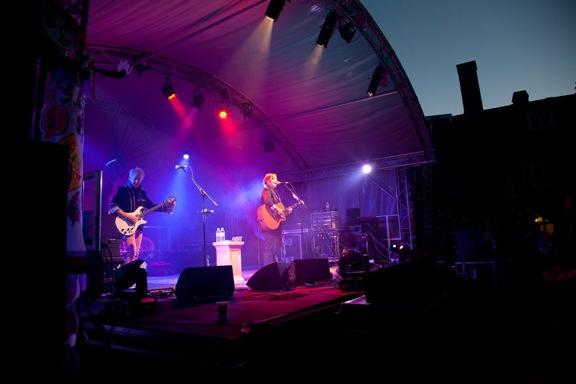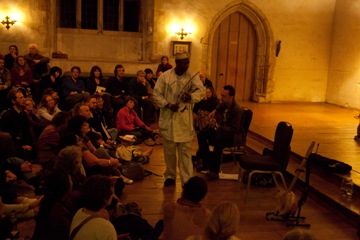theartsdesk at the Home Festival, Dartington | reviews, news & interviews
theartsdesk at the Home Festival, Dartington
theartsdesk at the Home Festival, Dartington
Second year of Devon gathering where guitars are plugged or unplugged to taste

While Michael Eavis’s fields were colonised by the solstice hordes, transforming a tranquil farmstead into a vibrant (and muddy) drop city, a very different and much smaller crowd assembled in the enchanting grounds of Dartington Hall in south Devon, for the second edition of Home, "a Festival with Acoustic Music at its Heart".
Now spread over Friday and Saturday, Home offers a family-friendly, laid-back and warmly intimate alternative to the star-heavy events of the summer season. Small, in this case, is definitely the measure of beauty: the largest stages have an audience of 400 each and they are scheduled alternately, so that the 100 per cent acoustic performances in the 14th-century Great Hall are not disturbed by the amplified music in the courtyard outside.
At one point on the Saturday afternoon, folk singer and fiddle player Jackie Oates, positioned in front of a large spherical David Nash sculpture of charred timber, charmed an audience of barely 100, conversing with the birds who seemed drawn to her soft soprano voice. Something happens when performers take the risk of leaving mics and amps behind: it takes courage, not least when the music is English traditional and contemporary folk, sung and played with delicacy and soul by a shy young lady and her guitar-playing accompanist. But this high-wire risk produces a pure sound with a touching and forceful presence, just because it is so very quiet. The audience has to reach out to listen, picking up a range of vibrations unfamiliar to our dulled ears. The effort required on both sides produces an intimacy that is absent from the more obvious thrill-seeking that goes with the full blast of amplification.

Home's organisers are not purists: the programme mixes acoustic and amplified music. The Tinariwen sound-alikes, Tamikrest, played lilting desert blues on the courtyard stage and then in the Barn Theatre: these are Tuareg youngsters for whom an electric guitar is a symbol of rebellion and a badge of modernity. It is appropriate that they should not be packaged in acoustic form to fit the festival’s espousal of "natural" sound. Later in the afternoon, Alejandro Toledo and the Magic Tombolinos deliver a frenetic global bouillabaisse whose Balkan gypsy pace gets the audience bouncing away on their feet. This is music – formulaic but fun - which thrives on amplification: excess is the key ingredient of its bumptious party character. Suzanne Vega (pictured above), with a jazzy voice and intelligent lyrics, accompanied by a versatile guitarist, worked hard to seduce her audience. She seemed to suffer from the tiredness that comes from churning out over-rehearsed songs, in a polished performance that ticked all the boxes - except the infectious feeling of risk and wholehearted commitment a more spontaneous set would have offered. If only she had dared do an acoustic set.
 Sitting in the bar nearby and waiting to perform acoustically for the first time ever, Justin Adams and Juldeh Camara (pictured right) mused slightly nervously on the challenge of communicating –unaided - with their audience: they could see that it might be difficult, not least finding the balance between the guitar and the horse-hair Gambian ritti, within the acoustic of Dartington’s magnificent but very large Great Hall. Above all, though, they relished the opportunity to break out of the comfort of their sure-fire routines and ride on the wave of uncertainty. They opened their set very quietly, with Adams softly picking his guitar. Camara entered the hall from behind the audience, surprising everyone with the filigree sounds of his one-string fiddle. As he walked cat-like towards his fellow musician, it was easy to see why ritti–players are known for their power over the spirits of the bush. He teased out the attention of his listeners, drawing them into the heart of the music, with sounds of beguiling subtlety and freshness. When he sang, he instantly knew how to work the acoustic of the Great Hall, from sotto voce rap-style admonitions in Fulani to muezzin-inflected full-throttle cries. Adams, a master in the school of charisma-without-ego, did what he does best: he urged and supported, ever alert to the slightest inflection in his Gambian partner’s musical discourse, elevating the conversation well beyond the realm of the mundane.
Sitting in the bar nearby and waiting to perform acoustically for the first time ever, Justin Adams and Juldeh Camara (pictured right) mused slightly nervously on the challenge of communicating –unaided - with their audience: they could see that it might be difficult, not least finding the balance between the guitar and the horse-hair Gambian ritti, within the acoustic of Dartington’s magnificent but very large Great Hall. Above all, though, they relished the opportunity to break out of the comfort of their sure-fire routines and ride on the wave of uncertainty. They opened their set very quietly, with Adams softly picking his guitar. Camara entered the hall from behind the audience, surprising everyone with the filigree sounds of his one-string fiddle. As he walked cat-like towards his fellow musician, it was easy to see why ritti–players are known for their power over the spirits of the bush. He teased out the attention of his listeners, drawing them into the heart of the music, with sounds of beguiling subtlety and freshness. When he sang, he instantly knew how to work the acoustic of the Great Hall, from sotto voce rap-style admonitions in Fulani to muezzin-inflected full-throttle cries. Adams, a master in the school of charisma-without-ego, did what he does best: he urged and supported, ever alert to the slightest inflection in his Gambian partner’s musical discourse, elevating the conversation well beyond the realm of the mundane.
The festival closed with Adrian Freedman breathing life and soul into the Japanese shakuhachi, a bamboo flute that relies on a rare combination of technical skills as well as the ability to improvise bravely through the eternal present. The now exhausted audience, hovering on the edge of sleep, may have received this ancient meditative music as a lullaby rather than the call to awakening that lies at its core. There was no doubt, though, in this moment of utmost tranquility that something more than the ear opens up when the acoustic challenge is so courageously embraced.
Explore topics
Share this article
The future of Arts Journalism
You can stop theartsdesk.com closing!
We urgently need financing to survive. Our fundraising drive has thus far raised £49,000 but we need to reach £100,000 or we will be forced to close. Please contribute here: https://gofund.me/c3f6033d
And if you can forward this information to anyone who might assist, we’d be grateful.

Subscribe to theartsdesk.com
Thank you for continuing to read our work on theartsdesk.com. For unlimited access to every article in its entirety, including our archive of more than 15,000 pieces, we're asking for £5 per month or £40 per year. We feel it's a very good deal, and hope you do too.
To take a subscription now simply click here.
And if you're looking for that extra gift for a friend or family member, why not treat them to a theartsdesk.com gift subscription?
more New music
 Music Reissues Weekly: Sly and the Family Stone - The First Family: Live At Winchester Cathedral 1967
Must-have, first-ever release of the earliest document of the legendary soul outfit
Music Reissues Weekly: Sly and the Family Stone - The First Family: Live At Winchester Cathedral 1967
Must-have, first-ever release of the earliest document of the legendary soul outfit
 Album: Robert Plant - Saving Grace
Mellow delight from former Zep lead
Album: Robert Plant - Saving Grace
Mellow delight from former Zep lead
 Brìghde Chaimbeul, Round Chapel review - enchantment in East London
Inscrutable purveyor of experimental Celtic music summons creepiness and intensity
Brìghde Chaimbeul, Round Chapel review - enchantment in East London
Inscrutable purveyor of experimental Celtic music summons creepiness and intensity
 Album: NewDad - Altar
The hard-gigging trio yearns for old Ireland – and blasts music biz exploitation
Album: NewDad - Altar
The hard-gigging trio yearns for old Ireland – and blasts music biz exploitation
 First Person: Musician ALA.NI on how thoughts of empire and reparation influenced a song
She usually sings about affairs of the heart - 'TIEF' is different, explains the star
First Person: Musician ALA.NI on how thoughts of empire and reparation influenced a song
She usually sings about affairs of the heart - 'TIEF' is different, explains the star
 Album: The Divine Comedy - Rainy Sunday Afternoon
Neil Hannon takes stock, and the result will certainly keep his existing crowd happy
Album: The Divine Comedy - Rainy Sunday Afternoon
Neil Hannon takes stock, and the result will certainly keep his existing crowd happy
 Music Reissues Weekly: Robyn - Robyn 20th-Anniversary Edition
Landmark Swedish pop album hits shops one more time
Music Reissues Weekly: Robyn - Robyn 20th-Anniversary Edition
Landmark Swedish pop album hits shops one more time
 Album: Twenty One Pilots - Breach
Ohio mainstream superstar duo wrap up their 10 year narrative
Album: Twenty One Pilots - Breach
Ohio mainstream superstar duo wrap up their 10 year narrative
 Album: Ed Sheeran - Play
A mound of ear displeasure to add to the global superstar's already gigantic stockpile
Album: Ed Sheeran - Play
A mound of ear displeasure to add to the global superstar's already gigantic stockpile
 Album: Motion City Soundtrack - The Same Old Wasted Wonderful World
A solid return for the emo veterans
Album: Motion City Soundtrack - The Same Old Wasted Wonderful World
A solid return for the emo veterans
 Album: Baxter Dury - Allbarone
The don diversifies into disco
Album: Baxter Dury - Allbarone
The don diversifies into disco
 Album: Yasmine Hamdan - I Remember I Forget بنسى وبتذكر
Paris-based Lebanese electronica stylist reacts to current-day world affairs
Album: Yasmine Hamdan - I Remember I Forget بنسى وبتذكر
Paris-based Lebanese electronica stylist reacts to current-day world affairs

Add comment